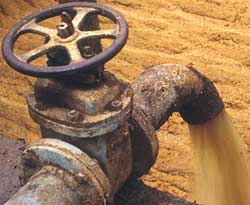Water has traditionally been considered common property. is industry included in this rubric? Yes, it is. Legally and by government fiat. This unfortunately means that industry pays a pittance for the large amount of water it uses. And this is where industrial water management in the country begins to go completely haywire. The root of the problem is the callous indifference of the government. It prefers to treat, in all its wisdom, the question of industrial water use as a ‘minor issue’. But is it really a minor issue? Not if we look at the recent data on industrial water use across the world (see p 65). But the government thinks otherwise.The government has not made any efforts to even collect data on the matter. Estimates by the Ministry of Water Resources (MoWR) indicate that water use in India is around 7-8 per cent of the total freshwater withdrawal in the country. This however, is in contrast to the economic trend. In general, industrial water use increases with increasing GDP, a fact that has completely escaped the MoWR’s attention. Its estimates on industrial and domestic water use has remained the same for the last two decades. However, the fact remains that industrial water use is increasing and in most developed countries, already exceeds agricultural water demand. Estimates indicate that India, too, betrays a similar trend. In the next two decades water consumption will triple current levels. But this is correct if we consider only the amount of water withdrawn. What about the amount of water polluted by wastewater discharge? On an average, for every litre of wastewater discharged, about 5-8 litres of water are made unusable for most human uses other than agriculture, hydropower and navigation. If we follow this logic, current water use by Indian industry is somewhere between 35-50 per cent of the total water used in the country, and not 7-8 per cent as the MoWR claims. We can thus, safely deduce that what we have at hand is certainly no ‘non-issue’, but a serious concern. The problem of industrial water (mis)management is fairly obvious. First, there is a lack of effective government regulations. The policies on water use are a whole lot of public health and water availability concerns. Their fragmentary nature renders them powerless. Secondly, there are few incentives provided to industry for efficient water use. Water tariffs, where they exist, are paltry and otherwise ignored. Conflicts between industry and local communities are on the rise over water appropriation. In this supplement of the Industry and Environment Unit of CSE, we have examined in detail the problem of industrial water use. We conclude that it is high time the government came out with an industrial water use policy. We have done the groundwork by identifying the different components of an environmental, ‘social’ and economical just water use policy for the industries. We hope the government will do the needful. Chandra Bhushan
|
|||

